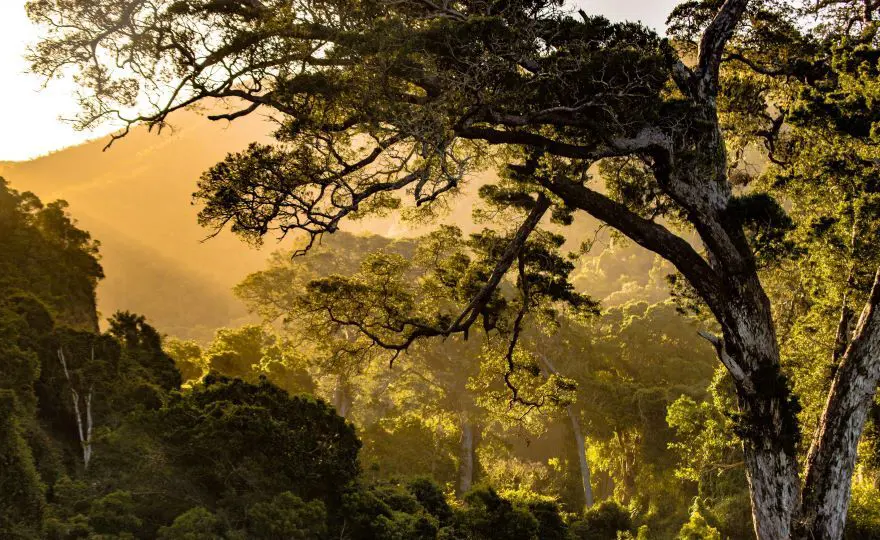ClientEarth Communications
7th August 2020


The Republic of Congo has passed a new law to help ensure more sustainable management of the country’s vast forests. Forests in the central African nation form part of the Congo Basin – the second largest tropical rainforest in the world after the Amazon.
As deforestation and forest degradation continue to threaten the Amazon and rainforests around the world, forests in central Africa will play a key role in mitigating climate change. The Congo Basin alone accounts for 70% of Africa’s forest cover, holds huge amounts of carbon, and contributes to the livelihoods of about 75 million people.
Strong national laws to preserve forests are an effective way to combat forest exploitation and illegal logging. That is why in Congo, ClientEarth legal experts have spent the past eight years working with local partner organisations to help draft a new law to manage forest resources more sustainably. A significant part of this has been supporting community and indigenous involvement in forest governance processes.
While details regarding its implementation remain to be addressed, the law nonetheless marks a big step forward in regulating and protecting climate-critical forests.
Congo’s new Forest Code received presidential approval in July and will govern the central African nation’s 223,340 sq km of forests – an area larger than Great Britain. While the law was approved by Parliament in April, its actual details have just been made public.
The legal reform process started in 2012 and is one of the key outcomes of the bilateral timber-trade agreement between the European Union and Republic of Congo, otherwise known as a Voluntary Partnership Agreement. The aim of this agreement is to ensure that all timber produced is legal.
A number of contributions from ClientEarth’s legal experts and their partners were included in the final draft of the law, including clauses to strengthen environmental standards and ensure communities’ participation in forest management. Key changes include:
Protecting our planet’s ‘second lung’
Forests in the Congo are home to an expansive ecosystem of plant and animal species. Despite its vegetation and peatlands acting as large carbon sinks, the exploitation of natural resources continues to threaten the ecological balance.
By prioritising better forest management, including strengthening community forestry rights, the new Forest Code can help protect the country’s biodiversity.
ClientEarth Senior In-Country Associate, Inès Mvoukani said: “Research proves that the best way to manage forests around the world is to have strong national laws governing them that recognise and secure rights of forest dependent communities.
“This new law is a crucial step towards more sustainable management of Congo’s invaluable forest resources and a tool for strengthening the rights of forest communities who are their most effective guardians.
“The vast forests of the Congo Basin act as the planet’s second lung. So globally, it is hard to overestimate just how important ensuring this wealth of ecological diversity will be in avoiding climate catastrophe.”
While the law is a notable improvement, there are concerns that it does not go far enough in providing legal certainty to enhance community rights. The extent of local communities and indigenous peoples’ use rights over forests is not yet clear, and will be addressed in implementing regulations to come.
There are also concerns that forest areas dedicated to community livelihoods remain subject to rules developed by logging companies. About two-thirds of the Republic of Congo is forest, and at present, an area larger than the size of England is used for logging. Weak implementation of the law could mean communities are consulted, but not actively involved in, determining the management of their own development areas.
It is essential that civil society and community representatives play a central role in the decision-making process of forest management. ClientEarth Law and Policy Advisor, Tanja Venisnik, said: “In order for Congo’s forest management to be sustainable into the future, the key improvements of the law need to be followed up by equally strong implementing regulations. In determining these next steps, active civil society involvement should be a priority.”
The legal reform process was an opportunity for local organisations and groups to participate in law-making processes, although it was not without setbacks and did not always allow enough time for people to take part.
Venisnik continued: “The Republic of Congo needs to promote transparency and inclusivity and ensure that communities – particularly indigenous ones, who depend of forests – are part of the legal and political process deciding forest management.”